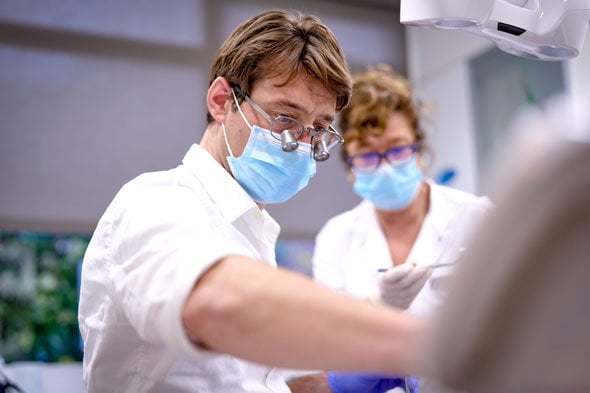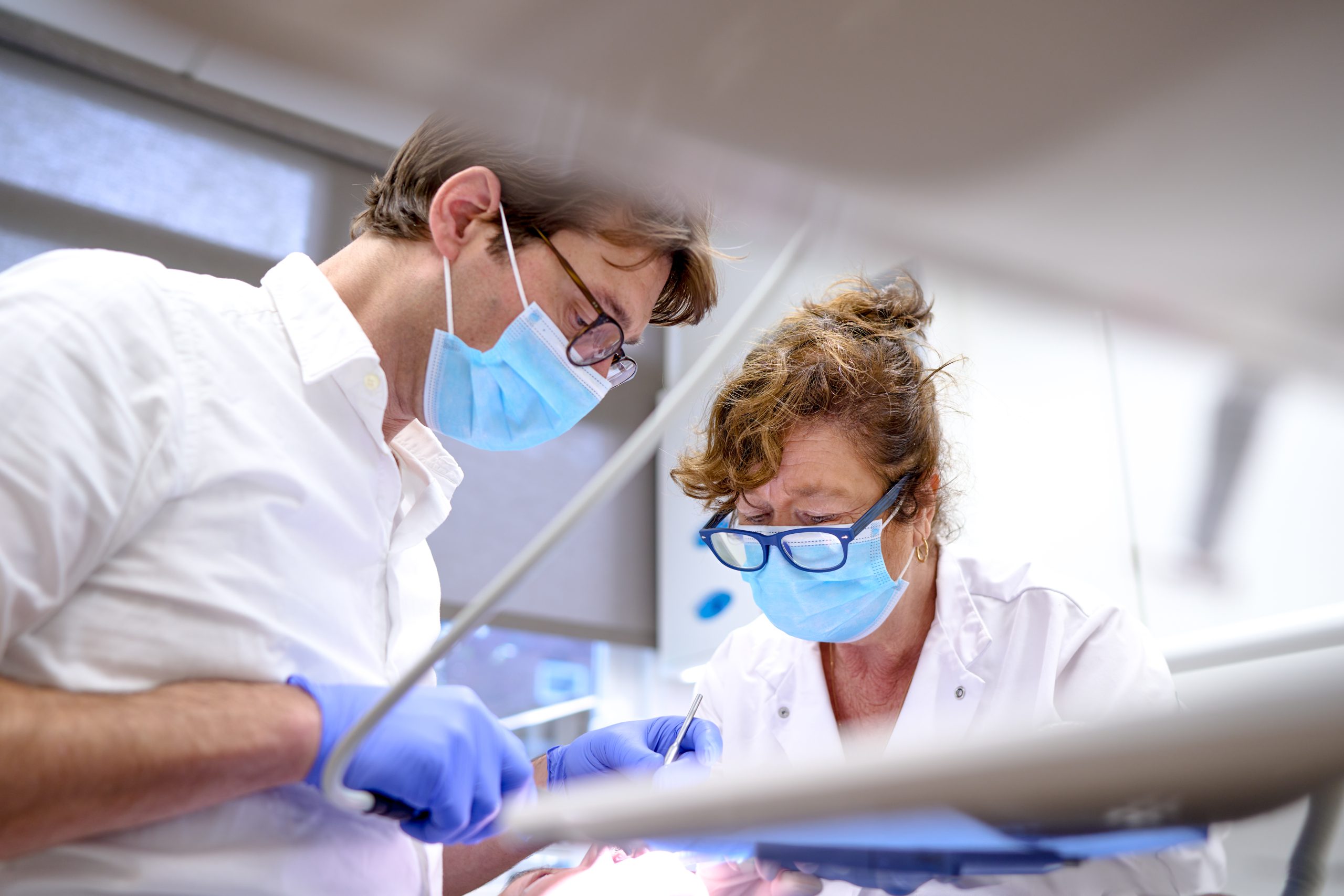Dentures/ dental prostheses
Tandartspraktijk Johan HuizingalaanProsthetics is the branch of dentistry that focuses on the making and adjusting of dentures and dental prostheses This can be necessary when you lose some or all of your teeth With missing teeth or molars, chewing or even speaking can be difficult. Moreover, it can affect your self-confidence because for example you no longer dare to laugh out loud. In this case, dentures, also often called dental prostheses is a good solution But what are actually the possibilities in the area of dental prostheses? What is the best choice for you and how much will it cost? At Tandartspraktijk Johan Huizingalaan we’re happy to help answer all your questions about dentures and dental prostheses
- Natural appearance of Dentures or prothese
- In-house Dental prosthetist
- Repairs/ rebasing possible on the same day
- The majority of the costs can be reimbursed from the basic health insurance (Confirm details with your health insurer)
Full or partial dental prosthesis
When you’re missing teeth or molars, you have two options: a complete or partial dental prosthesis Although both treatments are designed to improve oral functions and give you a beautiful smile, they have several important differences.
A partial denture, also known as a prosthesis, is a replacement for one or more teeth or molars and is, therefore, a good option when you’re only missing a couple of teeth or molars. Partial prostheses include the following types:
- Frame prosthesis:
This is a partial denture with some dental prostheses. - Plate denture:
This prosthesis is made of gum-coloured synthetic resin and contains some artificial teeth or molars. The plate rests on your palate, teeth and molars. - Dental implant:
The artificial teeth are attached to implants in the jawbone.
In addition to a partial denture, there is also the option of a complete denture. In this case, there is a complete denture that replaces all teeth in an upper or lower jaw. There are several ways in which complete dentures can be fixed in the mouth.
The first option is through braces that are attached to the existing teeth. This option is, therefore, only possible when you still have existing teeth/molars. Another method is dentures on implants. Metal screws are placed in the jawbone to serve as an anchor point for the dental prosthesis. Implants are a firmer way to place a dental prosthesis but are more expensive and require a surgical procedure. The last option is using adhesion, such as a special glue or paste. This is a good option if you don’t want or can’t use braces or implants.
There are advantages and disadvantages to both partial and complete dentures. It is therefore important to consider which option is best for you. The team from Tandartspraktijk Johan Huizingalaan are happy to help you make the right choice for your specific needs and budget.
Why dentures or dental prostheses?
Perhaps you’re not entirely convinced about the advantages of dentures or dental prostheses. However, there are a number of important reasons why this can be helpful for you:
- Improvement of oral health
When you have teeth or molars missing, this can lead to problems with chewing or speaking. Dentures can solve these problems and improve oral health. - Improvement of your appearance
Missing teeth can have an influence on your smile and as a result your self-confidence. Dentures or dental prostheses can make you feel better about your appearance and smile with confidence again. - Improving food intake
If you have difficulty eating certain foods due to the absence of teeth, dentures or dental prostheses can help you eat these foods again and thus eat a healthy and balanced diet.
How does the fitting of dentures work?
Dentures are not something you get fitted from one day to the next. First, an intake interview must take place, impressions must be made of the jaw, a bite registration must occur, and the prosthesis must fit properly. Below you will find a step-by-step plan of all the steps you will go through when you want to purchase dentures. Each step is equivalent to an appointment with one of our dentists.

Step 1: intake interview and establishing the treatment plan
In the first step of the treatment, we will determine what type of dentures is best for you. There are various options, such as a complete denture, a partial denture or a prosthesis on implants. The choice depends on what is possible and your wishes. If you have never had dentures before, your teeth may need to be extracted first. In that case, making a temporary prosthesis, also called an immediate prosthesis, can be part of the treatment plan. This prosthesis is placed immediately after extraction to limit swelling and promote recovery. When the treatment process can transition to a definitive prosthesis depends on the recovery.
Step 2: impressions of the jaw
During the second step of the treatment, impressions or scans will be made of the jaw using ready-made spoons. These impressions form the basis for a plaster model with which individual spoons can be made to measure. It is possible that this step is already completed during the first consultation.
Step 3: detailed Prints
During a subsequent appointment, detailed impressions will be made using custom-made trays. These spoons can clearly capture specific transitions in the mouth, such as muscle transitions. During this second bite phase, the most common mouth movements will be made with resistance from the material so that the prosthesis can provide space for this.
Step 4: bite registration
During the fourth step, the bite registration, the shape of the gums, any remaining teeth and the muscles in the mouth are recorded in detail. A bite plate is used to determine how the upper and lower jaws are positioned in relation to each other. The upper jaw is used as a starting point and the prosthesis for the lower jaw is adjusted accordingly so that the teeth fit neatly together. The shape and colour of the teeth are determined by biting into a wax layer from which a model is made. The original colour of the teeth is the starting point for this choice. A dental laboratory will then make the dentures.
Step 5: fitting the prosthesis
As soon as the dentures or dental prosthesis are ready, your dentist will schedule an appointment with you so that you can try on the teeth. Small adjustments are often necessary before the prosthesis fits perfectly.
Step 6: placing the prosthesis
During fitting, the dentist will ensure that your dentures are comfortable and fit properly. It will take some getting used to using the prosthesis and you may experience temporary discomfort while eating or pronouncing some letters. Usually, these problems disappear on their own over time.
Step 7: aftercare
With dentures, it is extra important to pay close attention to the hygiene of your mouth. For example, plaque and tartar on the implants can lead to inflammation of your oral mucosa and gums. We will provide you with proper instructions on how to clean your dentures. From the moment your dentures are fitted, we recommend you follow the steps below:
Repairs within a day
There are times when it is necessary to take quick action when it comes to repairing your dentures. Would you like to have your dentures or plate repaired on the same day? Since we have an in-house dental prosthetist at Johan Huizingalaan Dental Practice, that is no problem!
There are different types of repairs possible for dentures. This allows a new layer to be applied to the dentures (rebasing). It is also possible to replace a broken plate, this is also called a repair plate.
Do your dentures or plates need to be repaired? Or are your dentures hurting? Then contact us.
What do dentures or dental prostheses cost?
The cost of dentures or dental prostheses can vary greatly depending on whether you have partial or full dentures. Fortunately, much of the cost of your dentures is paid by your health insurance:
- 75% of the cost of a new denture or new plate is paid every 5 years from your basic health insurance package.
- 90% of the cost of repairs of your dentures is reimbursed.
- If you wish, you can take out additional insurance, which will reduce the costs you have to pay yourself.
Are you looking for a dental practice in Amsterdam Nieuw-West that is open 6 days a week? Registering can easily be done via our online registration form.
Frequently asked questions
Is it necessary to have all my teeth extracted to have dentures?
No, definitely not. It depends on your personal situation and what you yourself want. Some people choose to have all their teeth extracted and have full dentures made, while others choose to keep their remaining teeth and have partial dentures made. It’s important to discuss with your dentist what’s the best option is for you.
Do dentures hurt?
The placing of dentures is not painful. However, there may be temporary discomfort or pain after denture placement, especially if it is your first time having dentures. The discomfort usually disappears after a couple of days. If discomfort persists, you should contact your dentist.
Is it possible for dentures to be repaired?
Yes, dentures can be repaired. Sometimes, it is necessary to make minor adjustments to the dentures, for example, if a tooth or plate breaks or becomes loose. These repairs can usually be done on the same day at our practice. Sometimes, it is necessary to replace the dentures, for example, if they are very damaged or if the fit is no longer good. In that case, it may be necessary to have new dentures made.
Can my dentures discolour over time?
Yes, dentures can discolor over time. This can happen through exposure to certain foods, drinks (such as coffee) and tobacco products. To avoid discolouration as much as possible, it is important that you keep your dentures properly clean.
How long do dentures last?
On average, dentures last about 5 to 8 years. Exactly how long it lasts depends on how well you maintain your dentures. Good oral hygiene and avoiding hard and sharp foods can also positively contribute to the lifespan of dentures. However, it is normal to have to have new dentures made after a number of years, because the fit can change or because the dentures can become damaged.
How do I clean my dentures?
- You should clean your dentures after every meal with a denture brush and water.
- When cleaning your dentures, avoid using aggressive agents such as bleach or toothpaste. These things can be harmful to your dentures. However, you can use special cleaning agents or soap for this.
- It is best to clean your dentures with cold water.
- At night you should take out your dentures and place them in a bowl of cold water.
- Once you have removed your dentures, it is important that you brush your jaws and palate with a soft oral massage brush. For this, you can use toothpaste or lukewarm water.
Do you have more questions about having dentures fitted or their maintenance? Contact us by email or telephone. We’ll be happy to help you.
